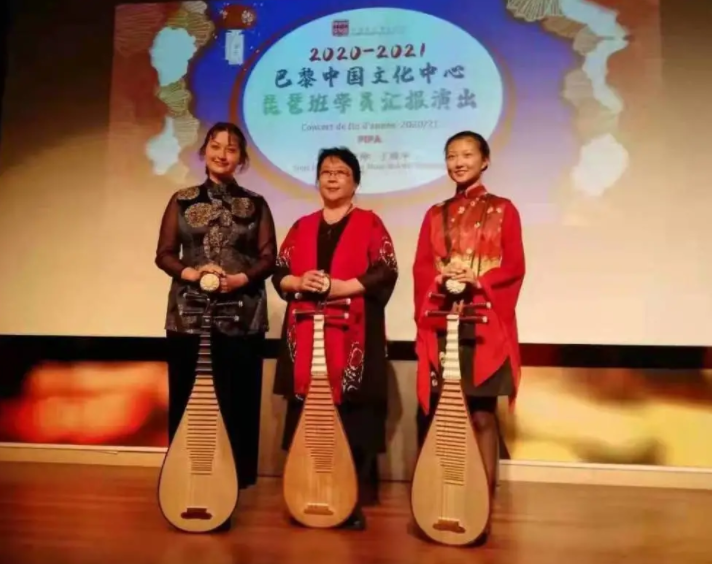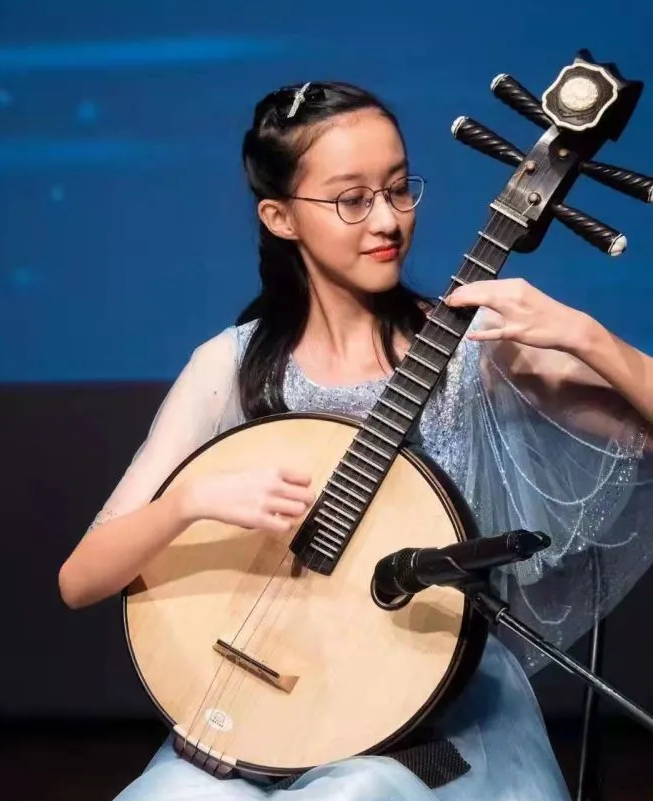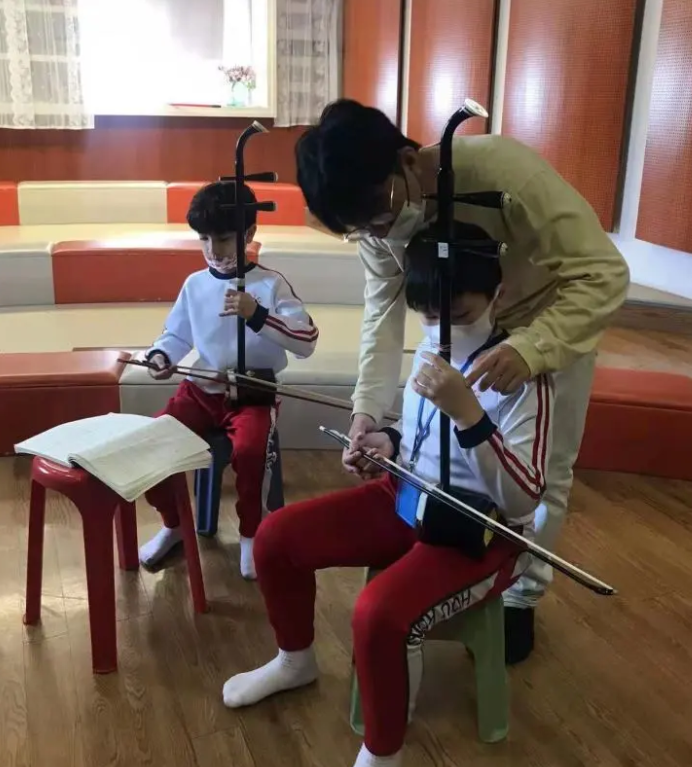People who spread Chinese national musical instruments at home and abroad in "One Tree Blossoms Fruits"
Chinese folk music shines brightly in the international cultural and art field, and there are more and more Chinese folk music learners and communicators at home and abroad. With their love and persistence, they inherit and transmit the sound of folk music all over the world, making folk music Appreciated and known by more people.
Sophie is a Chinese-French mixed-race girl. She started to learn piano at the age of 4 and pipa at the age of 7. She is currently studying piano at the Paris International Conservatory of Music. The fusion of Chinese and Western cultures is vividly reflected in her. "Arts are interlinked and we can learn from each other. Learning the piano enables me to accurately grasp the harmonic tones when playing traditional pipa repertoire. At the same time, the techniques of pushing, pulling, chanting, and musical tone in pipa can also be used in piano performance. Chinese music elements are incorporated into the processing of the music.” Sophy’s fusion and switching of Chinese and Western music forms amazed the teachers and students of the Paris International Conservatory of Music.

Sophie (left) and her mother Wang Weiping (middle) perform on the same stage at the Chinese Cultural Center in Paris
Sophie's musical journey is inseparable from one person, Wang Weiping, who is both a mother and a pipa teacher.
Wang Weiping is currently the chairman of the French Chinese Pipa Art Association and a pipa teacher at the Confucius Institute at the Chinese Cultural Center in Paris. As a senior pipa artist, she has been spreading Chinese traditional music culture in France for many years, teaching many students from different countries to learn pipa, among them also Including his daughter Sophie.
Because of her mother's careful teaching, Sophie made rapid progress and participated in many music and art activities, including the "Silk Road International Concert" held in Shaanxi during the "Sino-French Year", the 2nd French International Theatre Festival in 2016, The 2019 Commemorative Beethoven Works Concert, the 2020 Chopin Commemorative Works Concert, and the 7th National Youth Folk Instrumental Music Education and Teaching Achievement Exhibition have displayed the unique charm of folk music on multiple international platforms, and have achieved good responses.
"In addition to playing the pipa, I often learn Chinese songs and Chinese poetry at the Chinese Cultural Center in Paris, and I further feel the breadth and depth of traditional Chinese culture. When I participated in the CCTV network event last year, I recorded the pipa playing and singing "Spring River, Flowers and Moon Night", which made me deeply understand Poetic beauty," Sophie said.
When Su Fei practiced the pipa martial art "House of Flying Daggers", she continued to practice even though her left hand was worn out by pulling the strings. "Her dedication touched me very much. I have played this piece thousands of times, and today, it has finally passed down to my daughter." Wang Weiping sighed with emotion. Sophie also said that in the future, like her mother, she will spread Chinese culture overseas through Chinese folk music.

Huang Ziyu plays Ruan at school event
Singapore's Huang Ziyu started learning to play Nguyen at the age of 5, and this year is the 12th year.
She learned guzheng and piano when she was a child, and later she devoted herself to learning this instrument because she liked Ruan's timbre. She said that most primary and secondary schools in Singapore have Chinese orchestras, and students have a certain understanding of Chinese folk music. "I have been playing Ruan in various school activities since elementary school, so my schoolmates are more familiar with this instrument."
According to Huang Ziyu, Singapore holds competitions for Chinese orchestras in primary and secondary schools every year, and the Singapore Ruan Association also holds concerts frequently. She often invites her classmates and friends to watch performances together, and sometimes goes to the community with a few like-minded friends to perform in the community during holidays, for folk music of promotion. "If there is an opportunity to communicate, I would like to study at the China Conservatory of Music to learn more about Ruan and traditional Chinese culture," said Huang Ziyu.

Yu Xintong participates in activities in Shenzhen Concert Hall
Yu Xintong from Hong Kong, China, finally got her dream Guqin performance major in the Chinese Music Department of the China Conservatory of Music last year.
Yu Xintong followed her mother to attend some elegant gatherings with the theme of traditional Chinese culture since she was a child, tasting tea, appreciating Chinese characters, playing Tai Chi, listening to Guqin... Under the influence of her eyes and ears, she chose to learn Guqin when she was 12 years old. "As soon as I heard the deep and distant voice, I was moved, and it felt elegant and cool." Yu Xintong, who was "captured" by the guqin, also led friends around her to learn about the guqin and traditional Chinese culture. "When I was in middle school, my friends and classmates around me. I am curious about what a guqin is, and in order to let them know about it, I play it at school concerts or open days, and I introduce it through the radio during morning reading activities.”
When asked about her recent university life, Yu Xintong said she was particularly fulfilling. "In addition to having a lot of new learning directions in the major, I also learned a lot of new things outside the major, and I have a deeper understanding of the guqin in my hand." Yu Xintong said, "The excellent traditional Chinese culture itself has a powerful Attractive, while we are immersed in it, we also further enhance the sense of identity and belonging. I want to let more young people in Hong Kong understand Guqin, fall in love with Guqin, and more importantly, fall in love with Chinese traditional culture through Guqin. "

Fang Teng is teaching students
Fang Teng, from Macau, China, had a similar experience. In June this year, Fang Teng will return to his hometown of Macau after graduating from the Central Conservatory of Music. In fact, last year he entered Macau's Haojiang Middle School and started to work as an erhu music teacher. "The school is very supportive of my work, and has positioned erhu universal education as the school's future featured curriculum.
The school purchased 40 erhus for public practice. Since September last year, the school has handed over more than 200 students from 8 classes in the first grade to me, and arranges one erhu class every week. Fang Teng said that after half a year of study, the students have a preliminary understanding of the erhu. Today, most students can play a D scale. Although the progress is not fast, the goal of popularizing education has been achieved.
In addition, nearly 40 students took the initiative to sign up for Fang Teng's erhu leisure class and training class, and many of them showed their talent and enthusiasm. At present, the students of these two classes can already play some simple pieces such as "Edelweiss". Fang Teng said happily that in addition to the middle school, the school’s primary school also opened an erhu interest class. Nearly 60 people signed up when the class started. To this end, the school also hired an erhu teacher from the Macao Chinese Orchestra to teach with Fang Teng.
Chen Hong, Vice Principal of Macau Haojiang Middle School, said that Macau is an important link between China and the West. As a Chinese, we must promote and inherit the excellent traditional Chinese culture, and we must continue to cultivate children's patriotic feelings, and art is one of them. An important direction and entry point. "
The launch of the Erhu class not only cultivated the children's artistic literacy, but also popularized traditional Chinese cultural education. The children liked it very much, and the teachers were very attentive. After laying a solid foundation for erhu teaching, we will set up a small Chinese ensemble and go to the mainland for exchanges. At the same time, in the Yingcai School affiliated to Haojiang Middle School, the children learn both folk music and Western music. In the future, a Chinese and Western orchestra will be formed. "Chen Hong is full of confidence in the school's future folk music education.
Whether it is Sophie, Yu Xintong, Huang Ziyu and Fang Teng, they are all the best spokespersons for Chinese folk music. The deep roots of folk music have already taken root, blossoming and bearing fruit, and its development in the world can be expected in the future.
 渝公网安备 50010702504639号
渝公网安备 50010702504639号